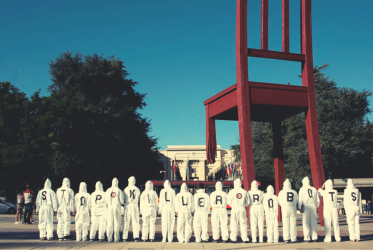Presentation by Peter Weiderud, Director, CCIA, at the Advocacy Days of the churches in the United States, Washington D.C., March 12, 2005
Dear friends and participants,
I bring you greetings from Geneva and the World Council of Churches and from
our General Secretary, Rev. Dr Samuel Kobia, who addressed this event last year,
as well as from colleagues and Christians all over the world.
The WCC was born at the same time as the atomic bomb and when the nuclear
arms race started. The concern for a nuclear war and the dedication to nuclear disarmament
has been following the Council throughout the years.
The language of the governing bodies of the WCC, addressing those issues, has
been both realistic and brave. By looking at nuclear arms from a moral and global
perspective and by seeking unity among churches, the WCC has been able to
address the issue with a forward-looking attitude, sometimes even ahead of its
time.
At its first Assembly, in Amsterdam, the WCC stated that "the part which war
plays in our present international life is a sin against God and a degradation of
man
the discovery of atomic and other new weapons renders widespread and
indiscriminate destruction inherent in the whole conduct of modern war
"
The second Assembly, in Evanston in 1954, responded to developments beyond
the atomic bomb. "The development of nuclear weapons makes this an age of fear.
True peace cannot rest on fear."
They called for a new international order with the elimination and prohibition
of nuclear weapons and a mechanism of effective international inspections and
control. Already in 1954, the churches formulated the main elements in what,
15 years later, became the Nuclear Non-Proliferation Treaty (NPT).
The NPT is the corner-stone in the international work for nuclear disarmament
and non-proliferation. In the NPT, the five recognized nuclear weapons states in
1968 committed themselves not to share this plague and to disarm and ultimately
eliminate their arsenals. In return, all other state parties agreed not to obtain
nuclear weapons, and to open themselves for inspections.
Between 1954 and 1961 the Commission of the Churches on International Affairs
spoke and worked intensively on the need for an international instrument to con-
trol nuclear testing. At the New Delhi Assembly in 1961 the churches called for
both no-first use and nuclear arms-free zones:
Christians must press most urgently upon their governments, as a first step
towards the elimination of nuclear weapons, never to get themselves into a
position in which they contemplate the first use of nuclear weapons.
Total
disarmament is the goal, but it is a complex and long-term process in which
the churches must not underestimate the importance of first steps. There may
be possibilities of experimenting with limited geographical areas
of neutralizing
certain zones.
The fourth Assembly in Uppsala in 1968 spoke about the inconsistency in the
policies to prevent nuclear proliferation.
The avoidance of atomic, biological or chemical war has become a condition
of human survival
The churches must insist that it is the first duty of governments
to prevent such a war, to halt the present arms race, agree never to
initiate the use of nuclear weapons, stop experiments concerned with and production
of mass destruction
and move away from the balance of terror
towards disarmament.
The concentration of nuclear weapons in the hands of a few nations presents
the world with serious problems:
a) how to guarantee the security of the non-nuclear nations;
b) how to enable these nations to play their part in preventing war;
c) how to prevent the nuclear powers from freezing the existing order at the
expense of changes needed for social and political justice.
Also the Nairobi Assembly in 1975 and several consultations in the 1970s continued
to address the nuclear arms race. In 1979, world public opinion was mobilized
after the Soviet invasion in Afghanistan and the US announcement to produce
the neutron bomb and deploy cruise and middle range missiles in Western
Europe.
The Central Committee, meeting in Geneva in 1980, urged "all nuclear powers
to:
a) freeze immediately all further testing, production and deployment of nuclear
weapons and of missiles and new aircraft designed primarily to deliver nuclear
weapons:
b) start immediately discussions with a view to making agreement not to enhance
the existing nuclear potential and progressively reducing the overall number
of nuclear weapons and a speedy conclusion of a comprehensive test ban treaty."
The year after, the WCC convened an International Public Hearing with church
leaders and political leaders. In its report to the Central Committee it stated:
The churches must unequivocally declare that the production and deployment
as well as the use of nuclear weapons are a crime against humanity and that
such activities must be condemned on ethical and theological grounds.
The Central Committee commended the report and renewed its call to churches
and governments to promote peace and disarmament. The next assembly in 1983
was held at a time when massive public protests were taking place around the
world against the nuclear arms race. The Assembly stated:
Never before has the human race been as close as it is now to total self-destruction.
Never before have so many lived in the grip of deprivation and oppression.
We call upon churches, especially those in Europe both East and West,
and in North America, to redouble their efforts to convince their governments
to reach a negotiated settlement and to turn away now, before it is too late,
from plans to deploy additional or new nuclear weapons in Europe.
During the period after the assembly and before the end of the Cold War, several
letters were sent to the leaders of the Soviet Union and the US asking for a
nuclear test ban, elimination of medium-range missiles, strengthening of the
Anti-Ballistic Missiles Treaty and reducing strategic arsenals.
After the end of the Cold War, the priorities of the churches were on other forms
of violence - conventional arms, small arms, domestic war. The development on
nuclear disarmament was very positive, with the help of the in-built political
energy from the decades of the cold war.
The NPT was extended indefinitely at the Review Conference in 1995 and more
countries became parties. Only India, Israel and Pakistan remained outside. We
achieved the Comprehensive Test Ban Treaty. The nuclear arsenals were reduced
from about 50,000 warheads to about half.
Although India and Pakistan came out as nuclear states, the Review Conference
in 2000 still made progress. The five nuclear parties to the NPT, in order to save
the treaty, committed themselves to ultimate elimination of their nuclear arsenals.
By that, the delicate balance of the NPT, where the nuclear parties commit
themselves to disarmament and elimination and others not to obtain, was kept.
Today, five years later we are at a situation were the NPT is at the risk of collapsing.
A breakdown of the fundamental instrument for nuclear disarmament and nonproliferation
will not only put us back to a Cold War-like nuclear arms race. It
might bring us to a situation of nuclear anarchy with a clear risk that nuclear arms
would be used against urban centres or in some of the asymmetric wars of today.
The crisis of the NPT is because:
a) No nuclear disarmament progress has been made by the two main nuclear
powers since the Moscow Treaty in 2002. That undermines the whole balance
of the NPT. If the two powers that are the most equipped with conventional
arms also insist on nuclear arms for their security, others who feel less secure
might look for the same.
b) There is a tendency in both Russia and the US to give a new military and
political role to nuclear weapons. Russia is developing new nuclear-carrying
missiles and the US is doing research on mini-nukes and earth penetrators.
c) There is an actual proliferation. Three countries outside the NPT are confirmed
as having nuclear arms - India, Israel and Pakistan. North Korea claims to
have them. The International Atomic Energy Agency, IAEA, is struggling
with Iran's enrichment programme. Also, non-state actors ready and able to
use terror are today organized in a way that they might obtain nuclear weapons.
Nuclear technology has been sold for profit. That did not happen during the
Cold War.
Therefore, the time has come for the churches to again seek unity and address the
issue of nuclear weapons. The WCC Executive Committee did so a year ago, reaffirming
the policy from the 1950s that the only defence against the use of nuclear
arms is prohibition, elimination and strong mechanisms for verification.
All countries have a responsibility to keep the NPT together.
India, Israel and Pakistan need to reject their nuclear programmes and become
parties to the NPT. North Korea and Iran need to comply with the Treaty and
abandon all uranium enrichment programmes.
Non-nuclear members of NATO need to fulfill better their moral obligations
under the NPT and have NATO renounce their reliance on nuclear weapons.
Those countries that have had the capacity and potential to obtain nuclear arms,
but have chosen to reject them for their own security and the security of others,
need to use their moral power in a more convincing way. In this group we find
Brazil, Canada, Germany, Japan, Sweden, South Africa, Ukraine, Libya and
Kazakhstan.
But the main responsibility lies with the nuclear weapons states and in particular
with the two main ones, Russia and the US. The list is long of what is needed
from them, and I would like to give you 11 specific items, which you can discuss
with your representatives at Capitol Hill:
- Halt to all nuclear weapons research and development
- Early approval and ratification of the Comprehensive Test Ban Treaty
- Rejection of strategic Ballistic Missile Defence
- Pledges not to be the first to use nuclear weapons
- Fulfill the unequivocal undertaking to the total elimination (Article VI)
- Never threaten or use nuclear weapons on non-nuclear parties to the NPT
- Remove all nuclear weapons from high alert status
- Remove all nuclear weapons from territories of non-nuclear states
- Make all disarmament agreement irreversible
- Commence negotiation on a Fissile Material Cut-Off Treaty
- Uphold and strengthen the multilateral framework for disarmament and
non-proliferation.
The churches and the ecumenical movement are present in all the above countries
and the international context. This is the time to be persistent in the witness
that "nuclear weapons cannot bring security and that nuclear arsenals deliv-
er only insecurity and peril through their promise to annihilate life itself and to
ravage the global ecosystem through which God sustains all earthly life."
Our immediate task is to advocate before and during the NPT Review Conference
in New York in May 2005.
If these efforts fail - and that risk is real - we need to be ready to mobilize all
possible ethical, spiritual and political energy to meet the challenges of a new and
more complex nuclear arms era.
The strength of the churches in working against nuclear weapons has been to seek
unity. If a minority speaks, the situation will not change. However, when the
churches can speak in unity it makes the difference.
Nuclear arms are an issue where Catholics, Evangelicals, Orthodox and Protestants
could and should speak with one voice. Putting yourselves in the place of God is
a sin that we always struggle with as human beings in modern life. The threat
with and use of nuclear arms puts a particular dimension on this sin. This might
be a departure point for improved dialogue on nuclear weapons with conservative
Christians in the US.
I wish you God's blessing in your important work on advocacy and awarenessbuilding
on nuclear arms in the US. Many Christians, all around the world, pray
for your success.
Many are willing to work with you.
Thank you.


